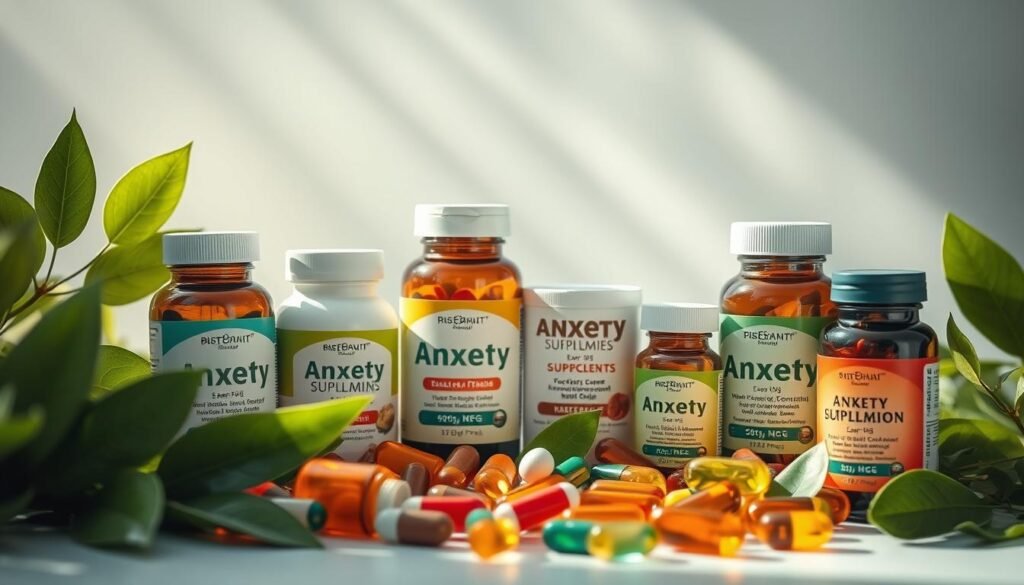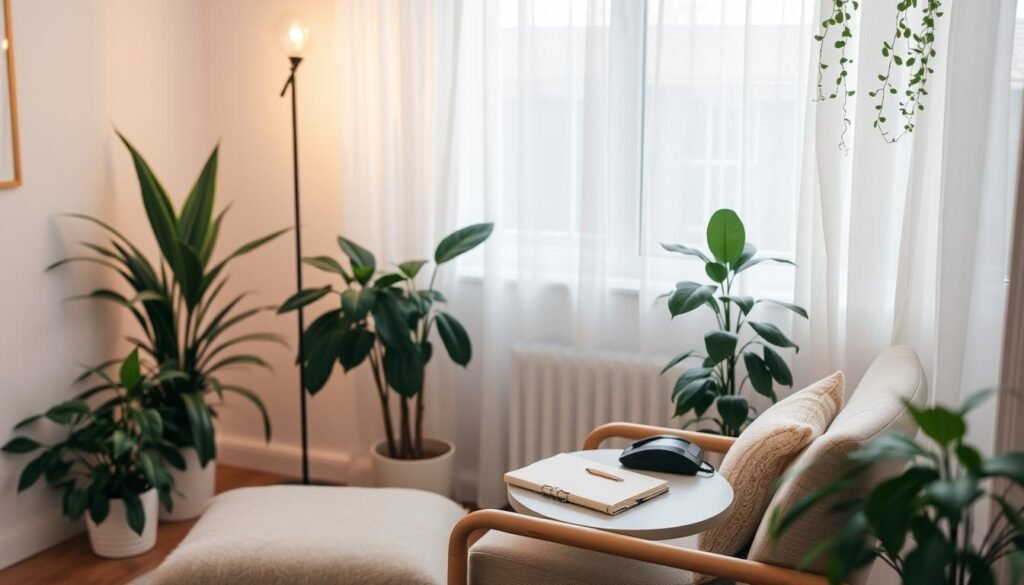Did you know nearly half of Americans lack enough magnesium? This mineral is vital for our bodies. It helps regulate muscles and nerves and affects mental health. For those with anxiety, finding relief often means looking beyond prescriptions. In this guide, we explore options including supplements, natural remedies, and lifestyle tweaks. These can boost well-being and ease anxiety symptoms.
Key Takeaways
- Magnesium is essential for bodily functions and may help reduce anxiety symptoms.
- Certain herbs like valerian root and holy basil show promise for anxiety relief.
- Omega-3 fatty acids can improve mood and mental health but should be considered carefully as a treatment option.
- L-theanine may promote relaxation without causing drowsiness, making it an effective anti-anxiety supplement.
- Combining lifestyle changes with OTC solutions can provide a well-rounded approach to managing anxiety.
Understanding Anxiety and Its Impact
Anxiety touches countless people worldwide. It shows up through both physical and emotional signs. Knowing about anxiety helps people recognize it and find ways to cope.
What is Anxiety?
Anxiety means feeling too worried or afraid about what’s coming. A lot of people, especially younger ones, experience it. It’s a big deal because it can stop people from doing normal day-to-day stuff.
The Symptoms of Anxiety
Everyone experiences anxiety differently, but common symptoms include:
- Increased heart rate
- Restlessness
- Irritability
- Trouble sleeping
- Excessive worry
Sometimes, these symptoms might be due to other health issues, like hyperthyroidism or low blood sugar. Doctors might need to run tests to make sure it’s really anxiety.
How Anxiety Affects Daily Life
Living with anxiety can deeply affect someone’s life. It might harm friendships, job performance, and happiness. Finding the right treatment can truly change a person’s life for the better.
The Role of Medication in Managing Anxiety
Medication can be key in managing anxiety, but it’s not the first step. Many people try therapy or lifestyle changes first. These methods can help handle anxiety without medication’s side effects. Knowing the difference between prescription and OTC options guides the best choice for relief.
Why Medication is Not Always the First Option
Experts often suggest trying other ways before medication. This is due to the side effects and risk of dependency. For example, benzodiazepines are commonly used but can lead to tolerance. Over time, you might need higher doses for the same effect. These concerns make healthcare providers lean towards non-medication options at first.
Differences Between Prescription and Over The Counter Options
There are both prescription meds and OTC options for anxiety. Prescription drugs, like SSRIs such as Prozac and Zoloft, are powerful for long-term management. These medications take a few weeks to work fully but can greatly improve life.
OTC options, on the other hand, are for milder symptoms. They provide quick relief with fewer risks compared to prescription drugs.
| Medication Type | Effectiveness | Onset Time | Common Side Effects |
|---|---|---|---|
| Prescription (SSRIs) | Moderate to High | 4 to 6 weeks | Fatigue, nausea, insomnia |
| Benzodiazepines | High | 30 minutes to 1 hour | Drowsiness, dizziness, memory issues |
| OTC Options | Low to Moderate | Varies | Minimized, but may include mild drowsiness |
Over The Counter Medication for Anxiety
Many people look for over-the-counter (OTC) anxiety remedies instead of prescription medications. Anxiety affects daily life for many. Learning about OTC choices helps people make smart decisions. Some products not specifically for anxiety are still used by many for mild relief.
What You Need to Know About OTC Options
There are different OTC options for tackling anxiety. Medications like diphenhydramine are popular for temporary symptom relief. Antihistamines are chosen for their soothing effects during anxiety episodes. However, these options don’t have the same strict checks as prescription treatments.
Popular OTC Medications and Their Uses
- Diphenhydramine: Known as Benadryl, it has sedative effects and helps with anxiety. It starts working in 15 to 30 minutes.
- Valerian Root: Taken as teas or supplements, it’s calming but may lead to headaches.
- Kava: It could reduce anxiety but is linked to serious liver issues, causing concern.
- L-theanine: Present in green tea, it helps relax without making you sleepy, reducing anxiety a bit.
These OTC meds are available in stores or online, with prices varying. Discounts and options like same-day delivery make buying easier. But be careful. It’s crucial to talk to a healthcare pro before trying them, as explained here.
Vitamins and Supplements for Anxiety Relief
Many people are trying vitamins and supplements to help with anxiety. There are many choices that can improve mood and help you relax. Studies show these natural options can really help soothe your mind. Let’s look at some top choices:
Magnesium: A Key to Calming the Mind
Magnesium, an important mineral, is crucial for how our brain works and our mood. Research shows magnesium supplements might lower anxiety, especially if you’re not getting enough. It’s known for its ability to reduce stress and bring calmness.
Omega-3 Fatty Acids for Mood Enhancement
Omega-3s, often in fish oil, are great for mental health. They help reduce anxiety and make moods more stable. Taking omega-3s regularly can boost mental well-being, which is why they’re highly recommended for easing anxiety.
Other Notable Supplements
There are also other supplements known for calming effects. L-theanine, from tea, is linked to stress relief. Other natural remedies like ashwagandha and valerian root may also lower anxiety. However, their success can vary from person to person. Below is a quick summary of these options:
| Supplement | Potential Benefits | Notes |
|---|---|---|
| Magnesium | Enhances mood; Calming effects | May improve anxiety in those deficient. |
| Omega-3 Fatty Acids | Improves overall mental health; Supports mood stability | Low intake linked to higher anxiety levels. |
| L-theanine | Reduces stress; Promotes relaxation | Found in green and black tea. |
| Ashwagandha | May reduce stress response | Effectiveness can vary; |
| Valerian Root | Supports relaxation and sleep | May not address root causes of anxiety. |

If you’re thinking about vitamins and supplements for anxiety, talk to a doctor first. This is important to make sure it’s safe for you and won’t mix badly with any medicines you’re taking.
Natural Remedies for Anxiety
Natural remedies for anxiety are becoming more popular. People are looking for other ways instead of conventional treatments. Aromatherapy and herbal options are liked for their comforting effects. They help bring a more peaceful mindset.
Aromatherapy: The Benefits of Lavender
Studies support the benefits of aromatherapy, especially with lavender essential oil. Lavender helps create a calm space. It aids in relaxing and lowering anxiety. The smell of lavender reduces anxiety. It is a favorite for use in homes and wellness areas. Adding lavender-scented items to daily life can help control stress well.
Exploring Herbal Options: Ashwagandha and Chamomile
Ashwagandha and chamomile are great herbal choices for easing anxiety. Ashwagandha is an adaptogen that can cut down cortisol, a stress hormone. This action helps ease anxiety symptoms. Chamomile is calming and has shown to slightly lower anxiety in studies. Drinking chamomile tea or taking supplements can help ease anxious feelings.
Exploring Alternative Anxiety Therapies
Many people seek effective ways to handle anxiety. Practices like mindfulness and activities such as yoga for anxiety are becoming popular. They help reduce anxiety and improve overall health.
Mindfulness and Meditation
Mindfulness lets people concentrate on the here and now. This reduces worrying thoughts. Regular meditation brings peace of mind. Studies show these methods truly lessen anxiety. They are great natural solutions. For more tips, visit natural remedies for anxiety.
Yoga and Physical Activity
Yoga for anxiety is an all-in-one solution that includes movement, breathing, and meditation. Just five minutes of exercise can fight anxiety, says the U.S. Department of Health and Human Services. Being active improves your mood and controls stress hormones, which is key for tackling anxiety.

| Type of Therapy | Benefits | Frequency of Use |
|---|---|---|
| Mindfulness | Reduces anxious thoughts, promotes present focus | Daily practice recommended |
| Meditation | Enhances inner peace, calms the mind | Several times a week, or daily |
| Yoga | Improves mood, regulates stress levels | 2-3 times a week |
| Aerobic Exercise | Boosts mood, reduces anxiety symptoms | At least 30 minutes most days |
Using these therapies can help with anxiety symptoms and emotional health. Adopting mindfulness, engaging in yoga for anxiety, and staying active are steps towards well-being.
Safety and Effectiveness of OTC Anxiety Treatments
Choosing over-the-counter (OTC) anxiety treatments needs thoughtful thinking about their safety and how well they work. Things like health conditions you already have and other medications matter a lot. Talking to healthcare providers before starting new treatments makes sure they’re safe for you.
Consulting with Healthcare Providers
Talking to a healthcare provider before trying an OTC anxiety solution is crucial. This step helps spot possible issues from mixing supplements with other meds. For those dealing with anxiety, discussing options like magnesium, valerian root, or ashwagandha with a pro can lead to safer, personalized choices.
Potential Interactions with Other Medications
OTC anxiety remedies can differ a lot in what they contain and how they work, which might cause unexpected problems. For example, antihistamines like diphenhydramine are not seen as effective for anxiety but can cause issues when taken with doctor-prescribed anxiety meds. Being aware of potential medication interactions lets people safely check out their options without health risks.
When to Seek Professional Help
Knowing when to get help for anxiety is key to better mental health. Many times, anxiety symptoms interfere with daily life, causing fear or worry. It’s vital to recognize these signs to know when to see a therapist.
Recognizing the Signs You Should Consult a Therapist
Certain signs show you need professional help:
- Constant worry that messes with day-to-day life.
- Physical issues like headaches, stiff muscles, or feeling tired.
- Problems sleeping or always feeling restless.
- Feeling like you can’t control your anxiety.
These issues can lead to more problems, like depression and more stress. Checking your mental health regularly is important. If anxiety keeps up despite trying to help yourself, think about getting in-depth treatment for anxiety.
Importance of Comprehensive Treatment Plans
Working with a therapist can give you a plan made just for you. A good treatment plan might blend therapy, medication, and changes in lifestyle. Therapy, especially Cognitive Behavioral Therapy (CBT), helps a lot with anxiety. Seeing a therapist helps figure out what’s going on and make a detailed plan, which might include meds if needed.
Getting professional help means you don’t just rely on over-the-counter meds, which aren’t approved by the FDA for anxiety. This approach helps you recover better and learn ways to stay mentally healthy for a long time.

Tips for Choosing the Right OTC Anxiety Solution
Choosing an over-the-counter (OTC) remedy for anxiety involves careful thought. There are many options out there. It’s crucial to consider your specific needs and symptoms. By thoroughly checking each product, you increase your chance of finding the right solution.
Evaluating Your Symptoms and Needs
Start by evaluating symptoms and identifying your anxiety triggers. Anxiety affects everyone differently. It could be situational or more constant. Knowing your health history and lifestyle helps in choosing OTC anxiety solutions. Advice from health experts or good sources helps find the best fit.
Reading Labels and Understanding Doses
Paying attention to reading labels is key for managing anxiety well. Ingredients and doses are crucial for safety and effect. Look for calming ingredients like magnesium and L-theanine. Check their amounts. Follow the recommended guidelines on OTC medications to stay safe. Homeopathic options, regulated for safety, offer more choices. Find good advice in this article.
It’s also crucial to know how new medications might interact with others you’re taking. Mixing treatments requires a cautious approach. For deeper understanding, talk to health experts or delve into literature on anxiety. Reading up, like with this resource, helps you make knowledgeable choices.
| Supplement | Effectiveness | Potential Benefits |
|---|---|---|
| Magnesium | High | Helps with PMS-related anxiety |
| Omega-3 | Moderate | Reduces inflammation and anxiety |
| L-theanine | High | Promotes relaxation without drowsiness |
| Lavender | Moderate | Reduces minor anxiety and insomnia |
| Ashwagandha | High | Lowers cortisol levels to reduce stress |
| Chamomile | Low | Modestly reduces anxiety symptoms |
| Valerian | Variable | May reduce anxiety, further research needed |
Understanding and evaluating your options for OTC anxiety solutions can promote better wellness.
Conclusion
Managing anxiety well usually means trying a few different things. It’s important to know a lot about anxiety to choose the best help. Over-the-counter options like Nature’s Bounty Anxiety and Stress Relief and Nutricost 5-HTP get good reviews. Yet, they are just one piece of a bigger plan. Combining these with lifestyle changes, being mindful, and getting advice from experts is key.
For those dealing with anxiety disorders, such as Generalized Anxiety Disorder and Panic Disorder, having a full plan is vital. Cognitive behavior therapy and medicine often serve as the main support. Products like Natural Rhythm Triple Calm Magnesium and OLLY Goodbye Stress Gummies show promise in easing symptoms. But fixing anxiety isn’t just about these items. Plans need to be made for each person’s unique situation.
In the end, finding relief from anxiety usually means using different strategies together. Knowing when to get help from a professional is crucial. It also matters to be open to a plan that looks at everything that could help improve your life. Taking steps to care for both your mental and overall health can help you find lasting peace from anxiety.